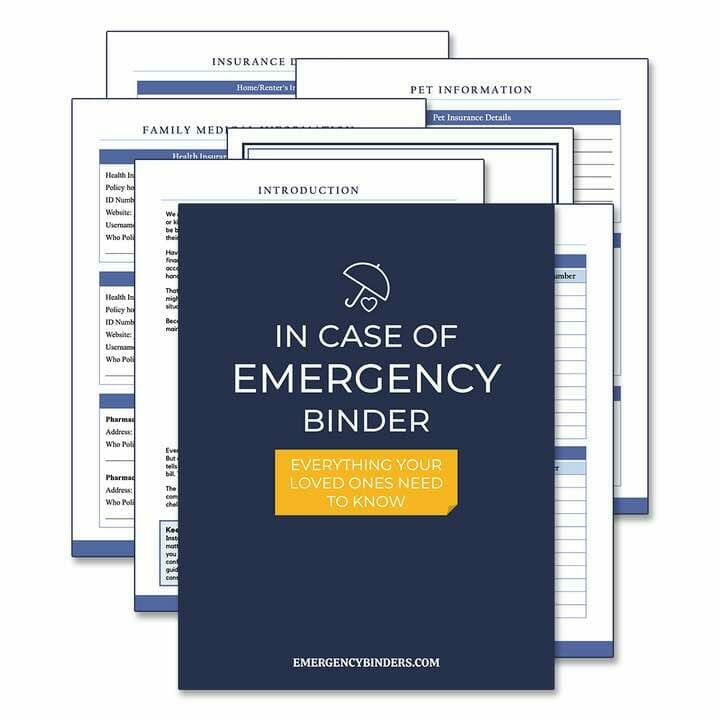Your parents cared for you for years, and now it’s your turn. As you parents start to reach an older age, there are several financial decisions that they will need to make. By not making some key choices now they could leave you and your loved ones with some difficult decisions later.
Talking about money and death is never a fun topic, but it’s important that you have those hard talks with your loved ones before it’s too late. It will save a lot of pain and frustration in the future.
TABLE OF CONTENTS
1. Life Insurance
Let’s get one of the most difficult out of the way, life insurance. Nobody wants to think about anything tragic happening to themselves or their parents, but not planning for the inevitable is one of the worst mistakes that you could make for your loved ones.
Life insurance will give you and your loved ones the money that they need in case something tragic were to happen to them.
When you or your parent are looking to buy life insurance, there are a couple of different types of plans that you should consider. One popular type of life insurance is a burial insurance policy (check out BurialInsurance.org for more information and pricing).
These plans are much smaller and are designed for older applicants that don’t have a massive amount of debt, but still, want to give their family the money to pay for any funeral fees. These plans usually only give around $25,000 worth of insurance coverage.
2. Will and Trusts
A will is one of the most important documents that you can have prepared. The will is a legal document that outlines how everything should be managed when they passed away. The will should cover everything from what happens to the estate to who gets all of the assets.
Every year, there are millions of people that pass away without a will, which can lead to months of frustration. A trust is very similar, but it describes how the funds from 401k’s and IRAs will be managed.
The advantages of a trust are:
- The information is kept private – no court oversight is required
- The Trustee can distribute assets quickly
- The dictates of the Trustor(s) are usually clearly spelled out in the trust and the Trustee simply carries them out.
What does a Trust Cost?
Crafting a living trust should not be a hasty decision. There are many elements that go into drafting a trust that protects assets and provides for beneficiaries.
Getting counsel from an experienced attorney is a good idea, but if your parent can’t afford that, there are other options.
A trust or estate attorney’s fees could range from $2000 to $10,000 depending on the attorney’s experience and the complexity of your parent’s estate. But we’ve also seen younger attorneys and some who are semi-retired charging less than $2000.
Finding a lawyer can be a daunting task. Start by asking friends who they have used. If you can’t find one that way, use a service like Lawyer.com to search. They offer discounted fees and a large searchable database of lawyers in your area and around the country.
Online options.
RocketLawyer charges a membership fee of less than $40 per month. Creating a living trust is one of the services included in that fee.
LegalZoom has boilerplate living trusts staring at less than $300.
LegalShield will help you craft a trust, using their team of lawyers for less than $30 per month.
3. Power of Attorney

A power of attorney is the person that can make legal decisions regarding your parents. This could be anything from financial decisions to legal matters. The person that has the power of attorney is going to have the final say in any decisions. It’s important that your parents name that person before it’s too late.
There are usually two powers of attorney that should be granted:
- Medical Power of Attorney. In the event of a parent being incapacitated the person with medical power of attorney can legally make decisions for them.
- Financial Power of Attorney. In the event of a parent being incapacitated the person with financial power can write checks, pay bills, or move investments for the benefit of the parent.
RELATED RESOURCE: The Family Emergency Binder
The Family Emergency Binder
Organize your family’s most important information – from finances to traditions to bedtime stories – so you’re prepared, no matter what happens.
The link below will take you to the EmergencyBinders.com website – an affiliate of MoneySmartFamily.com
4. Discuss Funeral Plans
Planning a funeral is not a fun way to spend a Saturday, but it’s crucial that you talk to your parents about how they want to be laid to rest. Sure, it’s going to be difficult, but if you don’t have this talk now, you’re going to have to make these choices while you’re grieving.
5. Long-term Care Insurance
Long-term care insurance works similar to a disability insurance policy. Long-term care will give you and your family the money that you need to pay for any assistance care that your parents need. If your parents ever need any long-term care, you’ll see that it can cost thousands and thousands of dollars every year.
Most people believe that Medicare will pay for these expenses, but in most cases, the program won’t pay for long-term care. There are only a few specific situations in which Medicare pays for any assisted living services. Otherwise, you’ll be paying for those bills out-of-pocket.
6. Investments in Retirement
Just because your parents have retired doesn’t mean that they shouldn’t be investing their money. Life is continually changing, and your investments should be changing with it. Retirement is a unique time of life, and the investments are going to reflect that.
Most people need to change their portfolios to safer investments to make sure they lock in all their gains from a lifetime of investing.
7. Hiring a Financial Planner
Managing your parent’s finances and looking at all of their investments can be difficult and confusing. Talk to your parents about hiring a financial planner. That can take a lot of stress off of both you and your parents. Having a financial advisor can help manage all of the finances and keep everything in one place.
Talking to your Parents
Don’t put off having these conversations. You never know what’s going to happen tomorrow, and while you don’t want to sit down and plan out these things, it’s one of the most important things that you can do for yourself, your parents, and your loved ones.
A Great Resource to Prepare for a Parent Talk

In preparation for talking to your parents, you may want to read the book “Beyond the Grave” by Gerald and Jeffrey Condon. It’s an insightful book about how to properly pass wealth from one generation to another.



What type of Life Insurance policy would you recommend? My husband and I are both 40, have two children, ages 8 and 10, and are self-employed (husband makes all the money :))
Victoria, we’ve always bought 10-year level term life insurance. Our goal was that by the time the kids are grown and gone, we could reduce the amount of insurance or eliminate it altogether.